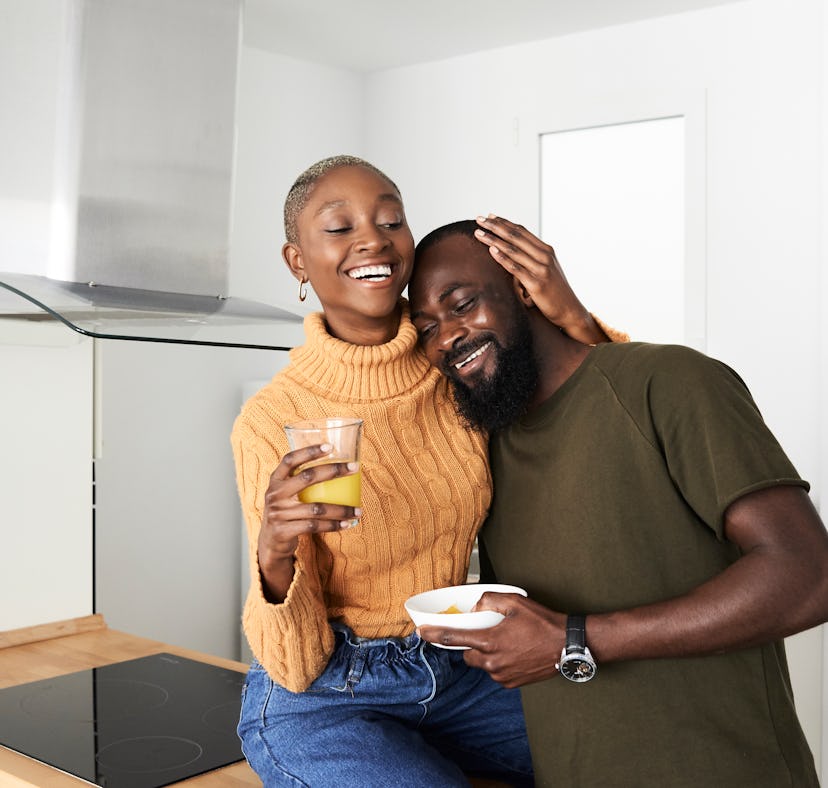
This Is Why Couples Baby Talk, According To Psychology
It's actually a sign of a healthy relationship.
By the time you're four or five years old, you're able to form full sentences and speak like an adult. It seems like you'd want to keep doing that forever — and yet, later in life, you may find yourself madly in love and talking like a baby once again. Sure, baby food is delicious (I just love good applesauce), but how many times have you heard a couple baby-talking in public and thought, "No, stop, please?" I wanted to know more, so I did some research to learn about the fascinating psychology behind baby talk in relationships.
Just so we’re clear, talking like a baby isn’t a disorder, and it’s not the same thing as literally acting like a child. Even though it might be perceived as annoying for people outside the relationship, it's not a sign of immaturity. There are actually very legitimate biological and psychological reasons why you might engage in baby talk with your partner, and understanding them can help bring you closer together.
Read on to find out everything you ever wanted to know about the three little words: “I wuv you.”
Baby Talk Is A Sign Of A Healthy Relationship
Baby talk isn’t just a way to create intimacy in a relationship — it actually means your relationship is healthy. “Baby talk or private couple’s speak is really about nurturing your partner and strengthening the bond between you both,” behavioral scientist Clarissa Silva tells Elite Daily. “It is an extension of the unconditional love we experienced as infants to provide us with security and ensure healthy developmental outcomes. Baby talk is mirroring the desire to strengthen the development and stability of the relationship.” It means you don’t need to put up your defenses around your partner, and instead, you can behave in the same way you did when you were young.
Baby Talk Mirrors How Your Parents Spoke To You
Part of why baby talk creates intimacy is that it might mirror the way you were spoken to when you first arrived in this world. The first people you bonded to on this planet may have been your parents or another adult, like a grandparent or guardian. Regardless, they probably spoke to you in that characteristic way people talk to babies (high pitched voices, oohing and aahing, you know the drill). “For many [couples], the closer the bond gets, the closer it mimics parental or caregiver unconditional love,” Silva says. “Pet names or baby talk is an expression of that.” Of course, it’s a different type of intimacy than the one you experienced when you were a baby, but it’s still the same feeling of giving and receiving love.
Pet Names & Baby Talk Display Vulnerability
Baby talk allows you to feel as loved as you were as a child, but it also lets you feel safe and protected by someone else. When you baby talk around someone, you don’t feel the need to impress them or present some perfect version of yourself. As with your parents or guardians growing up, you're vulnerable to your partner when you talk like a child. And having someone you can share safe days and safe spaces with is an extremely freeing feeling.
Talking Like A Baby Doesn't Mean You're Immature
“While it is perceived as immature, [baby talk] is a sign of a strong partnership and indicates relationship maturation and evolution,” Silva says. It doesn’t make anyone in the relationship less adult — much like other things you do in the bedroom or in each other’s company, baby talk is simply part of the relationship rather than a reflection on you. So what if you love calling each other “bubba” in silly voices? You still know how to pay your own bills.
A Secret Language Provides A Brief Escape
Do you ever wake up on Saturday morning after a long week of work and want to do nothing but watch cartoons? It’s not because you’re regressing into childhood, it’s because you need a brief respite from #adulting. Same goes for baby talk. “The most common reasons for couples' baby talk is to be playful, affectionate, and vulnerable simultaneously,” Silva says. So if your partner unexpectedly calls you "pooh bear," it might mean they need a little break from the big kid stuff.
You Engage In Baby Talk For Yourself, Not Your Partner
Baby talk can be more beneficial or intimate for the person doing the baby talk than the person receiving it. Even when parents are talking to actual babies, the baby talk benefits the adult because it allows them to see the baby as someone they need to protect, and this creates intimacy. Similarly, in romantic relationships, the person speaking like a baby develops warm feelings by doting on their partner.
Sure, at first it can seem odd to have grown adults speaking to each other like infants, but there are very good reasons for doing so. “A couple’s language and communication style is the majority of the relationship,” Silva asserts. “It shapes behavioral outcomes, work-life management, conflict resolution, and is a predictor of relationship health.” So, if you have the urge to tell your partner, “I wuv you so much” — don’t hold back!
Experts:
Clarissa Silva, behavioral scientist
This article was originally published on